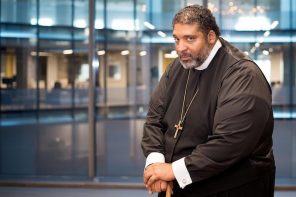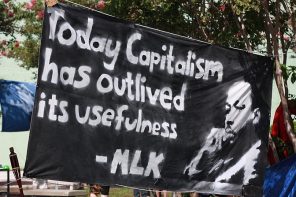At a time when so much of American politics seems incited by fear and hatred, it is inspiring to read the words of Rev. William Barber, asking Americans to act in accord with what Lincoln called “the better angels of our nature.” The Moral Mondays movement he spearheaded in North Carolina is a model of how citizens can band together to combat efforts to undo the vast social changes of the last half-century.
 I am impressed by Rev. Barber’s knowledge of American history, and how he finds in history a usable past for the current movement. As one who has devoted a good part of my academic career to studying Reconstruction, I applaud his finding inspiration in that oft-misunderstood era.
I am impressed by Rev. Barber’s knowledge of American history, and how he finds in history a usable past for the current movement. As one who has devoted a good part of my academic career to studying Reconstruction, I applaud his finding inspiration in that oft-misunderstood era.
It was in Reconstruction that this nation first attempted to come to terms with the destruction of slavery. Political leaders of rare vision rewrote the laws and the Constitution to embed the idea of equality among all citizens, a startling repudiation of the prior history of white supremacy. They implemented, for the first time, a functioning interracial democracy.
North Carolina, as Rev. Barber points out, experienced a remarkable degree of interracial cooperation. As late as the 1890s, a coalition of black Republicans and white Populists governed the state, until massive violence ousted them from power. The idea of what he calls “fusion” politics has a special meaning in North Carolina, given this experience.
The civil rights revolution of the 1960s is often called the second Reconstruction. It swept away the legal edifice of Jim Crow put in place around 1900 and inspired movements among young people, women and other racial minorities that made the United States a fairer, freer society. As in the first Reconstruction, these changes were followed by a backlash, which is still going on today.
I fully agree with Rev. Barber that today we need a third Reconstruction. It will not simply be a defensive effort to reverse the retrograde policies—in North Carolina and elsewhere—that inspired the Moral Mondays movement. A third Reconstruction, as he notes, must confront head-on the problem of economic inequality, which warps our political, educational and social lives.
Only the kind of cooperation across lines of race and gender—the “fusion” that Rev. Barber’s movement exemplifies, writ large for the entire nation—can hope to transcend the politics of fear, bringing about the changes this country so sorely needs.





